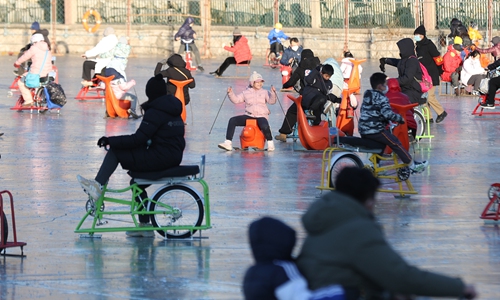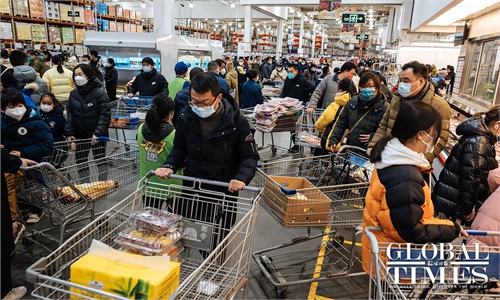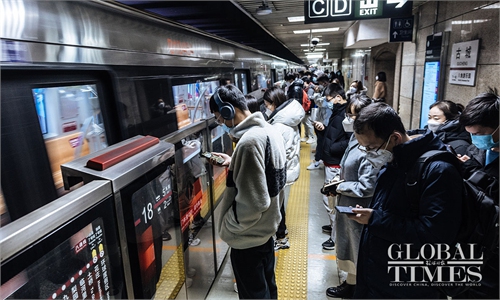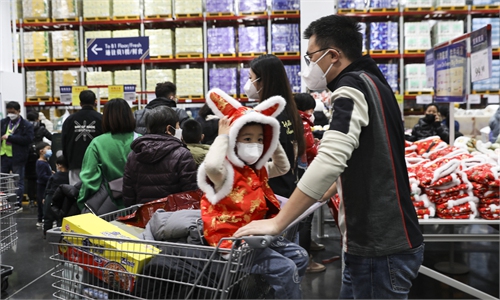Business activities pick up pace before New Year’s Day, a good omen for China’s consumption recovery

People play on an ice rink at a park in Beijing on December 29, 2022. Photo: cnsphoto
Ahead of the New Year's Day holidays, the first official holiday after China's optimization of COVID-19 control measures, business activities are picking up pace in many places across the country, including Beijing, with more and more people going out to eat, shop or travel, in what experts call a good omen for China's long-awaited consumption recovery.
"The familiar Beijing morning rush hour is back!" a local resident told the Global Times on Thursday, expressing delight that the city is coming back to what it used to be - a sentiment also shared by several other local residents. They noted that there are more people dining in restaurants or walking on the street.
A Beijing resident surnamed Li found that in the Peace World Plaza, which is connected to Beijing's Hujialou metro station, many restaurants were almost full at lunch time on Thursday. "The plaza's restaurants were very empty a few days ago when I passed them at around 5 pm. Now business has not fully recovered, but it has improved significantly," she told the Global Times.
As more and more people recover from the recent wave of coronavirus infections, many businesses related to the consumption sector saw their business rebound strongly, particularly prior to the arrival of the New Year's Day holiday.
One employee of a Beijing branch of the hotpot restaurant chain Haidilao told the Global Times that the store resumed dining-in business on December 7 and started to get busy around the past week.
"Now, diners usually need to wait for seats if they come to eat," the person said, adding that all seats have been booked for December 31, while there are also many reservations for lunch time on January 1.
"I feel that consumption has evidently rebounded," she said.
The tourism sector also sensed a comeback of consumption demand recently in Beijing. According to data revealed by domestic travel service platform qunar.com, ticket reservations at the Universal Beijing Resort increased by 418 percent in the week ended on December 25, compared with the previous week.
Bookings for tickets at Beijing's tourist sites surged by 177 percent in the week ended on December 23 on a weekly basis, data from ctrip.com showed.
Yang Yang, general manager of Beijing Spring Tour, told the Global Times that he has sensed a rebound in tourism demand, as many people who have just recovered from coronavirus infections can't wait to travel to warmer destinations like Sanya in South China's Hainan and Beihai in South China's Guangxi.
According to Yang, tickets for a chartered Spring Tour flight between Sanya and Tianjin are "improving on a daily basis." Tickets for the upcoming New Year's Day holiday period have also been fully booked.
"For this holiday, COVID-19 management measures have largely eased with no need for travelers to present nucleic acid tests, while many companies also no longer restrict people's travel. These moves are a big bonus for the tourism industry," he said.
Data sent by VariFlight to the Global Times showed that daily flights from Beijing, Shanghai and Chengdu to Sanya for the New Year's Day holiday have returned to pre-epidemic levels.
Beijing's consumption recovery also sets a good example for some other cities that are still bogged down with relatively severe coronavirus infections, and experts predict that China's consumption will rebound gradually on a nationwide basis, just like the situation in Beijing.
"People's consumption has been repressed for a long time, and in my observation, their consumption willingness still exists, but spending is restricted by various factors. For example, delivery and work resumption have not yet fully recovered," Hu Qimu, deputy secretary general of the digital-real economies integration Forum 50, told the Global Times.
According to Hu, the epidemic itself won't stop the consumption sector from recovering, and the sector should return to pre-epidemic levels around the end of the next quarter.
However, Hu suggested that policies should be rolled out continuously to speed up such a trend. "Policies to boost the consumption sector should not focus just on the consumption side, but should also aim at supporting the supply side," he said.



